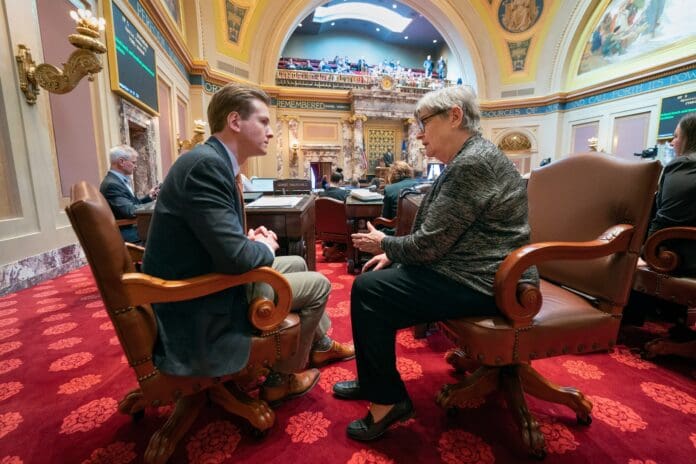In an update from the state house last week, Senator Grant Hauschild (DFL Dist 3) announced that he and seven fellow DFL Senators formed a Blue Dog Coalition last month.
Hauschild wrote, “We formed this coalition to push for more bipartisanship in the Senate. I am committed to continuing to work with my colleagues to improve the daily lives of Minnesotans.”
The eight Senators, Matt Klein, Nick Frentz, Judy Seeberger, Ann Rest, Rob Kupec, Aric Putnam, John Hoffman, and Hauschild, represent rural and urban districts across the state.
“We formed this coalition to push for more bipartisanship in the Senate. I am committed to continuing to work with my colleagues to improve the daily lives of Minnesotans,” Hauschild wrote.
The Blue Dog Coalition is a caucus of moderate Democratic Party members in the US House of Representatives. It was formed in 1995 after Republicans took over Congress and emerged as a voice for Democrats representing more conservative-leaning districts.
Legislative bodies have always had caucuses, partisan and bi-partisan, formed around issues, ethnicity, and geography. They serve several key purposes, from public advocacy to writing legislation and organizing votes.
Issue-based caucuses focus on specific policy areas like healthcare, education, or environmental protection. They allow legislators with shared interests to collaborate, often regardless of party. Ethnic/ Racial caucuses represent the interests of specific minority groups, ensuring their concerns are heard and addressed. Geographical caucuses represent the interests of specific regions or states, advocating for policies that benefit their constituents.
Caucuses provide a platform for members to share information, expertise, and best practices related to their specific focus.
In its mission statement, Minnesota’s Blue Dog Coalition says, “The Minnesota Senate Blue Dog Coalition stands for pragmatic, reasonable, and balanced policies that reflect the values of all Minnesotans. We are committed to problem-solving, collaboration, and the pursuit of fiscally responsible policies that support working families, small businesses, and communities in every corner of our state. We seek to bridge divides and bring bipartisan solutions that serve all Minnesotans, regardless of political affiliation.”
One explanation for the name Blue Dog Democrats is that founding members of the congressional caucus in the mid-1990s felt “choked blue by the extremes in both parties.” The name may also come from a long-time tradition of referring to a strong Democratic Party supporter as a “Yellow Dog Democrat,” who would “vote for a yellow dog” if it was listed on the ballot as a Democrat.
Yellow Dog Democrats is a political term applied to citizens in the Southern United States in the 19th century who voted only for candidates on the Democratic Party ticket. The term now generally refers to any Democrat who votes a straight-party ticket under any circumstances. Issue, ethnic, and geographical caucuses in legislative bodies serve a valuable purpose. However, the effectiveness and impact of caucuses vary depending on factors like the size and influence of the caucus, the political climate, and the leadership within the caucus.



